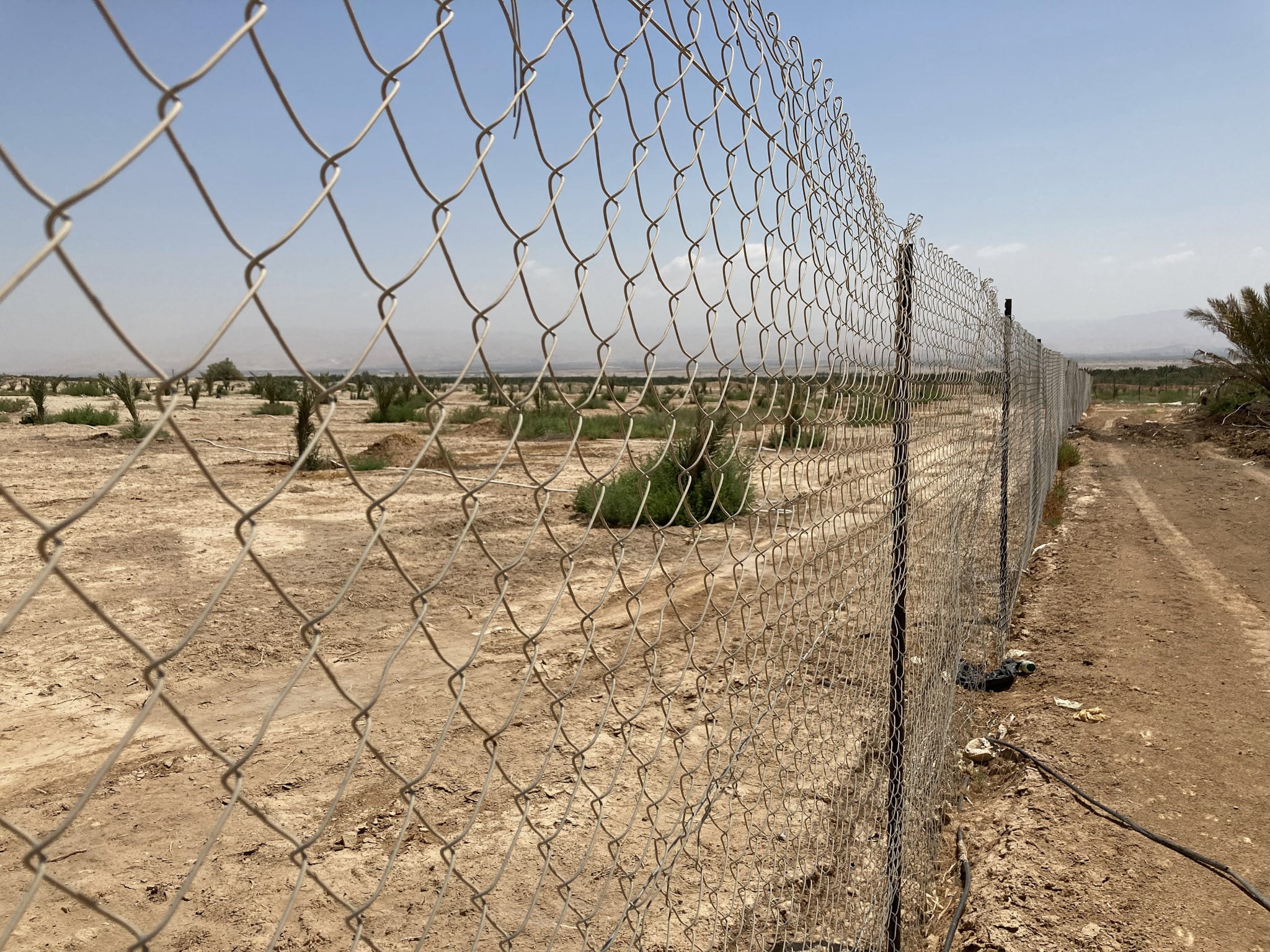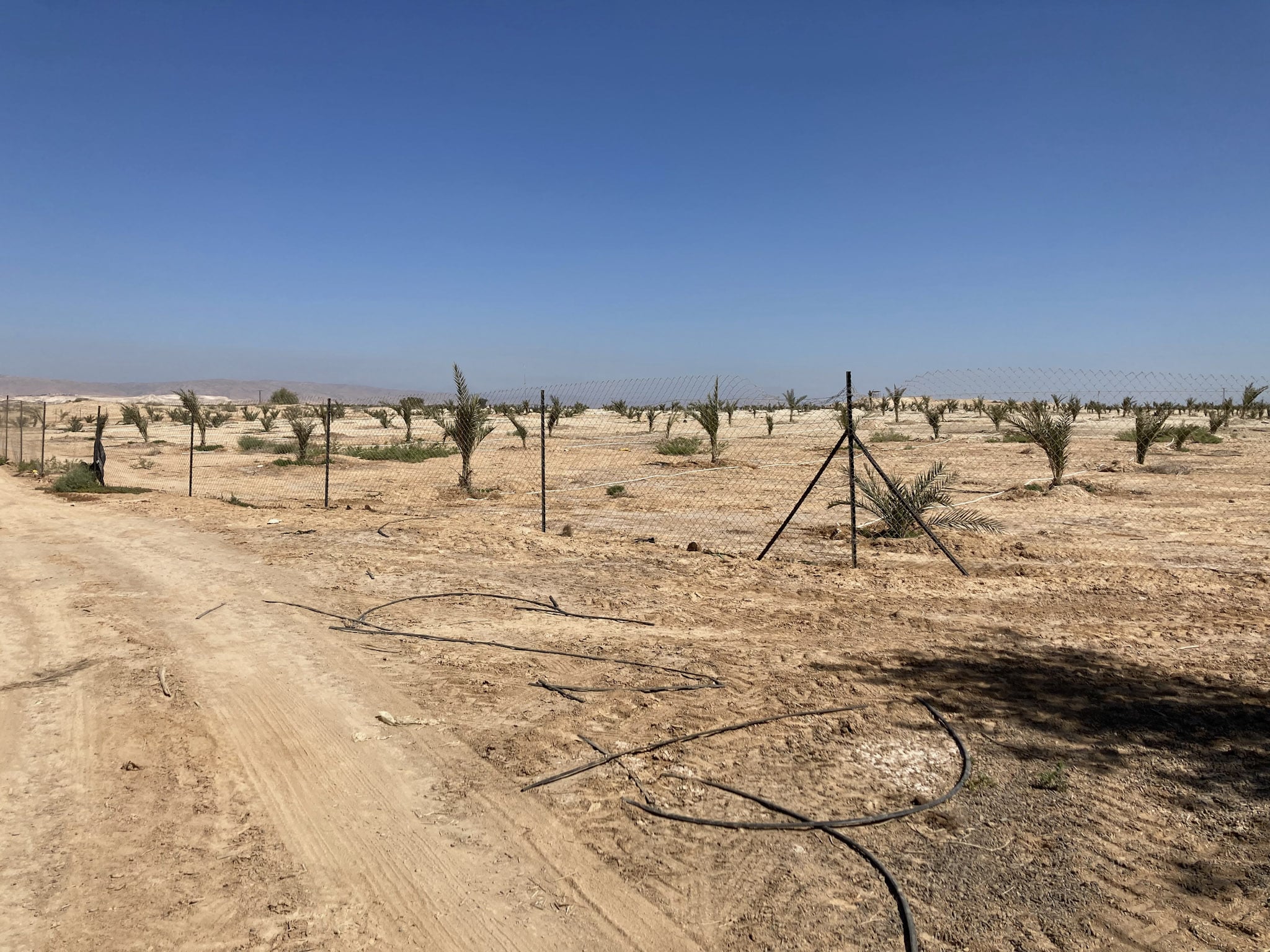‘They want to take our land, our water, and make us workers on our own fields.’
Ibrahim, Deir Hajla

Ibrahim Damras stands in front of his land taken for a settlement date plantation in 2021
To reach Ibrahim’s land and farmhouse, we tackle the uneven dirt road which runs along the fence of a vast new settlement date plantation. This was once land used by Ibrahim to grow vines. Ibrahim’s family have been farming the land in Deir Hajla since they were forced to flee Israel during the Nakba in 1948. This area of the Jordan Valley, just north of the Dead Sea, is particularly well suited for the cultivation of dates and watermelons. However, the confiscation of Palestinian land for Israeli settlement expansion has meant that Ibrahim’s farmland has shrunk dramatically. At one time cultivating around 250 acres, Ibrahim and his cousin are now left with just 70.
The Jordan Valley is often considered the breadbasket of Palestine, with its fertile soil, diverse water resources and high temperatures which enable early harvests in winter and summer. Citrus fruits, grapes, vegetables, herbs and dates can be grown in abundance. The area has been said to offer potential for a viable Palestinian state in terms of strategic location and economic success.
However, 95% of the Jordan Valley is designated ‘Area C’. In 1993-5 the Oslo Accords divided the West Bank into Areas A, B and C. Area C, which comprises the majority of the West Bank and includes the most fertile agricultural areas and land reserves with development potential, was placed under full Israeli military control. Israeli policies in Area C restrict Palestinian construction and development, making large areas inaccessible by designating them closed military zones, nature reserves or ‘state land’, and seldom approving Palestinian requests for building permits.
‘Israel’s planning and building policy in the West Bank is aimed at preventing Palestinian development and dispossessing Palestinians of their land.’
At the same time, Israel encourages the expansion of settlements. In contravention of international law, settlements are developed exclusively for Israeli citizens on occupied Palestinian land. These settlements have detailed plans and enjoy large amounts of land and connection to advanced infrastructure. In the Jordan Valley there are around 38 settlements, all engaged in agriculture and cultivating at least 8,000 acres of land.
Ibrahim’s land has been taken over by four settlement farms that now surround his small remaining plot.

Dates from settlement plantations advertised at a Dead Sea settlement resort

Dates from settlement plantations advertised at a Dead Sea settlement resort
‘I don’t have enough land left to pass on for my children
Ibrahim, Deir Hajla
Agricultural settlements in the Jordan Valley, often industrialised and with sophisticated irrigation systems, benefit from around 18 times more water availability than Palestinian farmers. Israeli government incentives such as agricultural subsidies, tax breaks and discounts on water, encourage their development and expansion. Companies such as Carmel Agrexco export agricultural produce from Jordan Valley settlements and generate hundreds of millions of dollars annually.
As we sip strong cardommon-infused coffee among the last of the season’s watermelon crop, Ibrahim tells us how difficult it is to farm this land.
Ibrahim is unable to obtain a permit from the Israeli authorities to make repairs to his road, his reservoir tank or farmhouse. According to Israeli organisation Peace Now, between 2009 and 2018 only two per cent of all requests submitted by Palestinians for building permits in Area C were granted (98 of 4,442). Palestinians are often left with no choice but to build houses, wells and infrastructure without a permit and face the constant threat that these will be demolished for violating Israeli planning law. By contrast, the Israeli authorities recently issued permits for at least 2,233 settlement housing units.

Ibrahim is unable to obtain a permit to make repairs to his farm building
‘I will stay here, but I suffer a lot for it.’
Ibrahim, Deir Hajla
Without the use of his reservoir tank, Ibrahim’s only available water source is a shallow Jordanian well which provides salty water. Palestinians in Area C are prohibited from digging new wells or deepening existing ones. The inaccessibility of water makes farming extremely precarious and limits the type and amount of crop Ibrahim can produce. Israel controls all water sources and restricts Palestinian access to water throughout the West Bank. Around 180 rural Palestinian communities have no access to running water and are forced to buy expensive tankered water. Settlers living in Area C face no such restrictions or shortages. The Israeli state-owned water company Mekorot has developed water infrastructure in the West Bank that supplies settlements with roughly four times that of Palestinian communities.
Despite sharing nearly identical environments, the agricultural yield in occupied Palestine is only 43% of the yield in Israel. This discrepancy is largely caused by the lack of water and fertiliser available to Palestinians. The Israeli government has placed restrictions on fertiliser, deeming it ‘dual-use’, potentially security-threatening and lowering the maximum concentration level allowed. As a result, Palestinian farmers struggle to compete with the yields of settlement farms which face no such restrictions.
Ibrahim tells us, without enough water or fertiliser:
‘for each dunam* of land, I can produce 2 tonnes of watermelons, compared to the 8 tonnes produced on settlements’.
*1 Dunam = .25 acres
Produce from settlements are then sold more cheaply on the Palestinian market, forcing prices down and making it even harder for Palestinian farmers to sustain a living.

Ibrahim shows EAs the poor state of his irrigation system
‘They want to take our land, our water, and make us workers on our own fields.’
Ibrahim, Deir Hajla
Without enough land to cultivate, other members of his family, like many Palestinians in the Jordan Valley, are left with few options but to work in settlements to make a living. 98.3% of Palestinian farmers in the Jordan Valley have lost productive capacity due to land confiscations and Israeli restrictions. Four of Ibrahim’s brothers and cousins who were once farming their own land, now have to work in settlements. For many, they say it is the only way to support their family. Depending on the season, between 10,000-20,000 Palestinians work in settlements. Israeli worker’s rights organisation Kav LaOved found that Palestinian workers in Jordan Valley agricultural settlements are routinely denied worker’s rights and are paid as little as one-third the minimum wage.
Israel’s appropriation of land to build agricultural settlements, the exploitation of resources and the imposition of Palestinian building make it extremely challenging for Ibrahim and others like him to sustain a life here.
‘Israel’s policies in this area manifest themselves in a variety of practices that are geared toward creating increasingly unliveable conditions for Palestinian communities located in the Jordan Valley, de facto forcing them to leave the region.’

The settlement fence separating Ibrahim from his land

The settlement fence separating Ibrahim from his land
‘Without access to Area C, sustainable recovery in the Palestinian agricultural sector is not conceivable, nor is it possible to build a robust economy capable of underpinning a viable Palestinian State.’
Take action!
-
Use our quick template letter and contact links to send this eyewitness story to your elected representatives urgently. Ask them to call upon the Israeli government to ensure Palestinians unobstructed right to water, in compliance with international law.
-
See the challenges faced by Ibrahim and other farmers like him by taking a political tour of the Jordan Valley. Organisations such as Green Olive tours offer short tours of the region, starting and ending in Jerusalem.
-
Learn more about water inequality in the West Bank on our water page.

